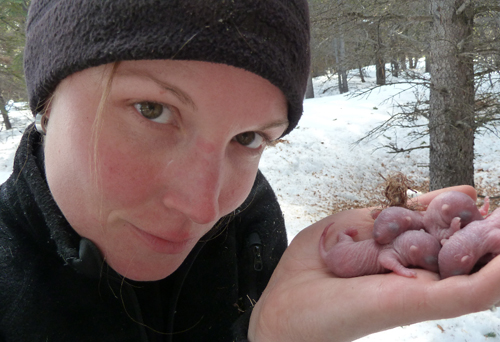
How does childhood stress affect you as an adult? How might doctors better treat depression or post-traumatic stress disorder? A U of G biologist studying early life stress in songbirds and squirrels hopes her work will tell us more about the human brain, including ultimately how to prevent or treat stress-related disorders such as depression.
You likely have heard a song sparrow’s clear notes and trills ringing across a marsh in southern Ontario, even if you didn’t notice the dun-coloured creature. “It appears rather drab, but its song is amazing,” says Amy Newman, a post-doc in the Department of Integrative Biology. “It’s one of the most complex songs in sparrows.”
So what has this songster to be stressed about?
Plenty, it turns out. A male looking for a mate needs to make its voice heard amid those of its neighbours. These birds are singing for their genes’ survival, says Newman – hence their intricate melodies weaving together some 20 kinds of songs. “If you’re a sexy male singing with greater complexity, then a female is more attracted to you than the boring guy who sings the same song in the shower every day.”
The competition – and the chorus – ratchets up when more birds arrive to contest a territory. That competition in turn affects young birds relying on their parents to find food in a more crowded marketplace.
Biologists know that male songbirds raised with less food – a form of stress – end up with smaller brain regions involved in song control. “The bird brain is exceptionally plastic and responds to stress,” says Newman.
Stress also affects hormone levels.
One defence – not just in songbirds but in people, too – is the steroid hormone DHEA. Newman’s PhD work in neuroscience at the University of British Columbia (with collaborators at the University of Western Ontario) showed that DHEA protects the song control area in bird brains against reductions caused by stress.
Songbirds can be stressed by adding a caged male to a territory and observing changes in songs, brains and hormones in the local males.
Here at Guelph, she’s working not with Melospiza melodia but with savannah sparrows. Rather than focusing on songs, she is studying the effects of manipulating the number of eggs in the birds’ nests. More or fewer nestlings affect how much food is available to each of the young.
For part of the past three summers, Newman has worked at a research station on Kent Island in New Brunswick. Located on the Bay of Fundy, that station is home to a variety of birds.
At Guelph, she’s starting to work with integrative biologists Nicholas Bernier and Andreas Heyland. She says U of G opens lots of doors for possible collaborations. “The whole environment of the integrative biology department is unique. Not so many people have that opportunity across Canada, that mix of physiology and ecology.”
For Newman, that applies to more than sparrows. Working with integrative biologist Andrew McAdam as an NSERC post-doctoral fellow, she’s looking at stress and brain changes in red squirrels.
That work involves a long-documented population that is the subject of the Kluane Red Squirrel Project in the Yukon. McAdam is a principal investigator in this large-scale field experiment looking at ecology and evolution of red squirrels; scientists have studied the animals there for more than two decades.
As with songbirds, the squirrels are highly territorial. Their stress levels can be altered readily at even the hint of competition. Newman is studying how that stress affects not just mom squirrels but their pups.
She has visited “squirrel camp” in the boreal forest for three summers. For that work, researchers play recorded squirrel chatter to fool pregnant females into thinking food resources will be tighter.
In 2010, she tested the stress response in young pups. She returned this year to check those pups’ own reproductive success and test their stress response.
She has found that patterns are set for young squirrels even while they are still in the womb. “Exposure to prenatal stress causes young squirrels to show more response to stress as adults.”
That suggests epigenetic factors are at work, including environmental stressors that can change gene activity in offspring without altering their genetic code. Researchers are still learning more about how these systems work.
Whether it’s songbirds or humans, short-term stress can help the organism to adapt. Referring to squirrels, Newman says, “They are programmed to deal with the environment. What they learn programs them for the real world.”
But what prepares you for short-term stresses may cause problems in the long term – maybe even shortening your life.
Studying birds and squirrels might help us learn more about human brains, she says, including the long-term effects of early life stress and what happens in people with depression.